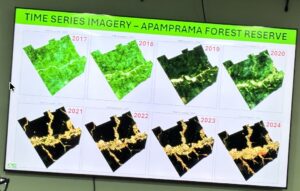
Gabriella Tetteh, NDC Regional Communication Officer
Gabriella Tetteh, the Central Regional Communication Officer of Ghana’s opposition National Democratic Congress (NDC), has attracted attention for her recent shift in social media content. Instead of promoting her party’s political agenda, she has turned her focus to sharing culinary content, particularly Jollof cooking tips.
With a substantial social media following, Gabriella has drawn notice of her culinary passion, regularly sharing recipes, cooking techniques, and culinary experiences on her Facebook timeline. Notably absent from her posts is a political promotion for the National Democratic Congress, leading some to question whether she effectively represents the party online.
This shift in Gabriella Tetteh’s online presence is evident. She has been observed defending the government against pro-opposition media outlets, such as Loud Silence Media and its affiliates, while also offering cooking advice, including recipes for red oil Jollof and chicken with broccoli. Occasionally, her posts delve into unrelated topics, including sharing quotes and making insinuations.
Apart from birthday wishes, the last instance of her posting party-related content on her Facebook timeline was during the Assin North by-election and its subsequent events.
It remains uncertain how her party’s leadership has responded to this change in her online activity. Critics argue that her approach may not align with the NDC’s objectives, as her culinary content appears to overshadow her political messaging.
This situation raises questions about whether Gabriella Tetteh’s social media activity accurately reflects her party’s stance on national issues. Some critics suggest that the party’s leadership should address this matter to ensure consistent and effective communication of their message to the public.
Gabriella Tetteh recently garnered attention for publicly criticizing pro-opposition media, stating her dependence on Joy News and Citi TV for news while disparaging other media outlets as ‘jandam’ (inferior).
Gabriella’s deliberate actions, seemingly aimed at undermining her party, have led to widespread questioning of her loyalty and the process that led to her election as the Communication Officer in a pivotal election-deciding region like the Central Region.
This has sparked a discussion about whether political parties should establish guidelines or codes of conduct for individuals representing and embodying their authority.
The future of Gabriella’s online presence, whether culinary content continues to dominate or she refocuses on promoting the NDC’s vision for the country, remains uncertain.
As Ghana approaches upcoming elections, the role of party communication officers in shaping public opinion and conveying their party’s message will undoubtedly remain a topic of scrutiny and discussion.






